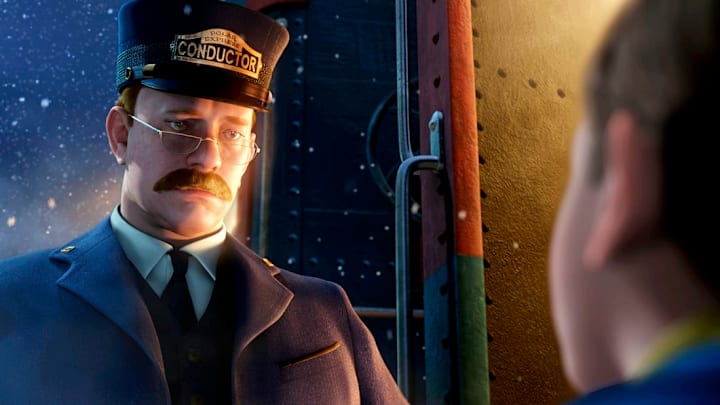The Polar Express (2004) was already a beloved story when Robert Zemeckis adapted it into his first fully-animated feature. Based on the classic 1985 children’s book by Chris Van Allsburg, it follows a young Santa Claus skeptic on a magical train ride to the North Pole on Christmas Eve. From its hidden references to its groundbreaking use of technology, here are some things you might not know about the hit film.
- It’s the first movie filmed entirely with motion capture.
- The animation wasn’t a hit with everyone.
- The main boy doesn’t have a name.
- Tom Hanks played five characters.
- Three actors brought the main character to life.
- There are nods to Back to the Future.
- The director’s hometown gets a shout-out.
- The Polar Express was modeled after a real train.
- There’s an homage to railroad history.
It’s the first movie filmed entirely with motion capture.
Motion capture—the process by which filmmakers animate characters using recordings of live-action movements—was still a relatively new technique in 2004. When making The Polar Express, Robert Zemeckis decided to use the technology to its full extent by animating every character this way. According to Guinness World Records, the film was the first all-motion capture film ever made.
The animation wasn’t a hit with everyone.
Motion capture has become a popular technique in high-budget films that blend CGI and live action, but it failed to take off in animated features. One reason may be that human characters animated in a hyper-realistic style tend to border on the slightly creepy side. Critics described the human characters in The Polar Express as dead-eyed and zombie-like, and the film is still brought up as a prime example of the so-called “uncanny valley” (the unsettling feeling that people have when interacting with androids or other super-realistic humanoid simulations).
The main boy doesn’t have a name.
Like most of the children in the film, the main character is never given a name. He’s simply listed in the credits as “Hero Boy.” Other characters were given a similar treatment, with names like Hero Girl, Know-It-All, and Sister Sarah.
Tom Hanks played five characters.
In addition to the lead boy, Tom Hanks played the character’s dad, the conductor, the hobo, and Santa Claus in The Polar Express, bringing his total character count up to five. Because the movie was made using motion capture, Hanks had to act out each part on a soundstage as well as speak the lines. In cases where two of his characters would share the screen, Hanks would have to act opposite a stand-in before switching to his second role to film the rest of the scene.
Three actors brought the main character to life.
Two actors lent their vocal talents to the Hero Boy—Tom Hanks, who plays the character as the adult narrator, and Spy Kids star Daryl Sabara, who voices him as a child. There was a third actor who’s not listed in the voice credits but who still played a big part in making the Hero Boy feel real. Along with Tom Hanks, The Hunger Games star Josh Hutcherson, who was just 12 years old when the film was released, did motion capture work that was used to animate the character.
There are nods to Back to the Future.
Robert Zemeckis has directed several blockbusters over his career, but Back to the Future (1985) is undoubtedly one of his most beloved contributions to cinema. Sharp-eyed viewers will notice that the director inserted some references to the earlier film into The Polar Express. In the beginning of the animated movie, we’re shown a photograph of Santas on strike outside the Twin Pines Mall—the same place where Marty McFly successfully time travels for the first time. There’s also a flux capacitor hidden on the wall of the train’s engine room (which can be seen in the clip above).
The director’s hometown gets a shout-out.
Unless you have a deep knowledge of Zemeckis’s childhood, this Easter egg likely flew over your head. Toward the beginning of The Polar Express, the conductor shouts out what sounds like a random address: 11344 Edbrooke. This is actually the address of the home where Zemeckis grew up in Chicago.
The Polar Express was modeled after a real train.

It doesn’t take passengers directly to the North Pole, but a real-life version of the Polar Express does exist in Owosso, Michigan. When looking for a locomotive to serve as a model for the one in the movie, filmmakers chose the Pere Marquette 1225, one of the largest operational steam trains in the country at the time. The film crew took inspiration from everything from the look of the engine to the sound of its movements when creating the CGI Polar Express. The Pere Marquette 1225 still takes passengers on pleasure rides under the name “The North Pole Express” every year around the holidays.
There’s an homage to railroad history.
The level of detail that went into the Polar Express train itself isn’t the only part of the movie that will delight railfans. In the North Pole, the filmmakers snuck in a few references to locomotive history. The architecture in the city is modeled after the former Chicago company town for Pullman Palace Car Co., which was one of the biggest American railcar manufacturers in the 19th century.
Read More About Your Favorite Christmas Movies:
A version of this story originally ran in 2018; it has been updated for 2024.
